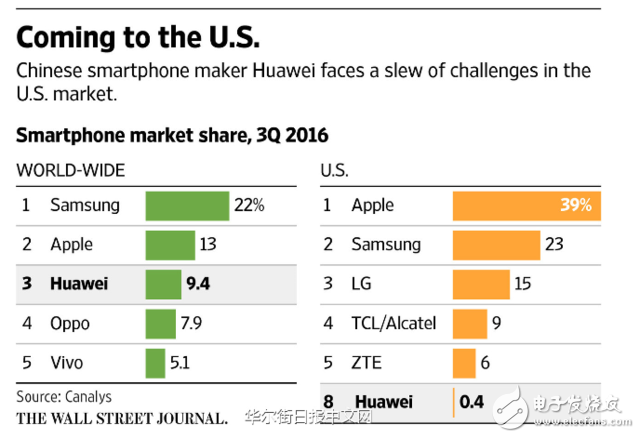According to the Wall Street Journal, Huawei Telecom Co., Ltd. (Huawei)’s telecommunications network equipment is still being rejected by the United States due to security concerns. Huawei still faces success in the US smartphone market. Many obstacles. According to people familiar with the matter, US carriers that account for more than 80% of the US mobile phone sales market are reluctant to cooperate with Huawei because of Huawei's low brand awareness and security concerns related to its network equipment. A report from the US Congress in 2012 recommended that US operators not use Huawei equipment in their networks because they fear that China may use this to monitor Americans. Huawei has denied such allegations, saying the company's operations are independent of the Chinese government. In addition, there are technical barriers related to cellular standards, which will make Huawei's expansion in the United States costly. To meet the cellular standards of Verizon CommunicaTIons Inc. (VZ) and Sprint Co. (S), Huawei must make large-scale and costly modifications to its mobile chips. According to people familiar with the matter, considering the degree of vigilance of the US government toward Huawei, Verizon and Sprint also believe that it is unlikely that Huawei devices will be added to their already overcrowded contract phone options. A Huawei manager who is not willing to be named in the United States said that Huawei has not found a way to remove these obstacles. The company faces great challenges. Huawei said this month that it will launch a high-end Mate 9 smartphone in the United States. But according to people familiar with the matter, the phone, which is priced at 699 euros (about 759 US dollars) in Europe, will only be available through online retailers such as Amazon.com (AMZN). Huawei has not disclosed the price of the US market and the specific release date. According to the report, Ren Zhengfei, a Huawei-born soldier, was founded 30 years ago. The growth of business in China, Europe, the Middle East, Africa and Latin America has driven the company to become a large enterprise. In terms of shipments, Huawei is the world's third-largest smartphone maker, second only to Samsung Electronics Co. and Apple Inc. (AAPL). However, according to research firm Canalys, Huawei sells low-priced models in the US, and the US market share in the third quarter was only 0.4%. Apple and Samsung Electronics have a 39% share and 23% share in the US market. The United States is the biggest missing piece in Huawei's global expansion strategy for smartphones. According to Canalys, the US is the world's largest market for high-end phones that sell for more than $500. Entering this market will help Huawei achieve its goal of surpassing Apple and Samsung Electronics in five years and becoming the world's largest smartphone manufacturer. In addition, Huawei has a patent dispute with T-Mobile Us Inc. (TMUS), so it is unlikely that the two will cooperate. Although Huawei is more hopeful about the possibility of working with AT&T Inc. (T) and has communicated with the telecom giant, it is unclear whether the two agree to establish a partnership. The American Telephone Telegraph and Verizon are the two largest telecom operators in the United States. Banknote Value Counting Machine One CIS Suzhou Ribao Technology Co. Ltd. , https://www.ribaoeurope.com